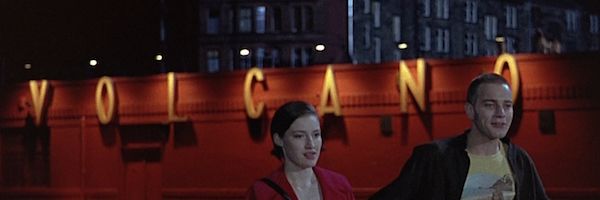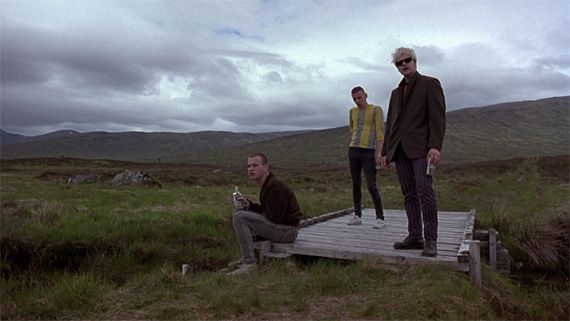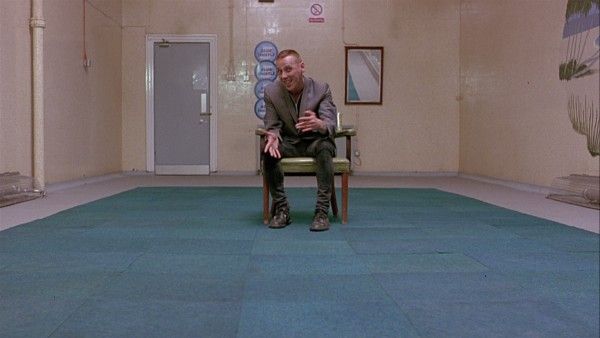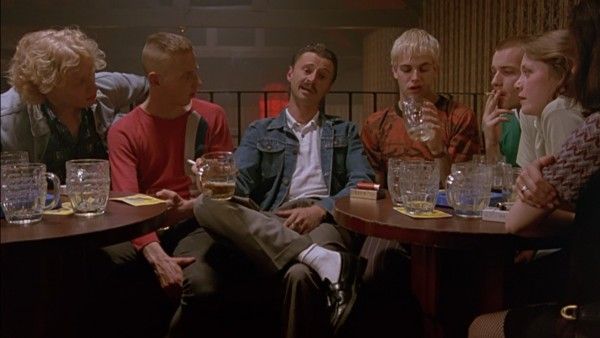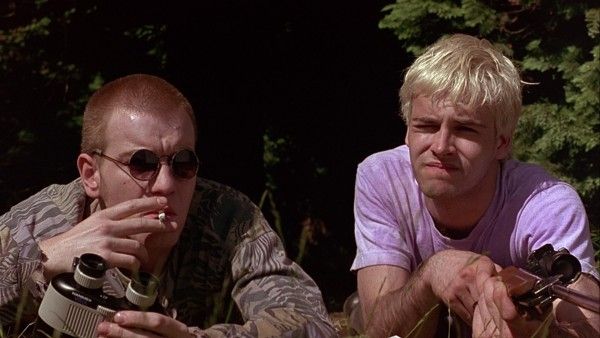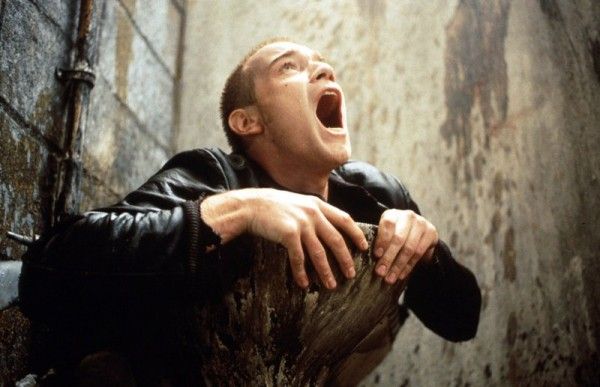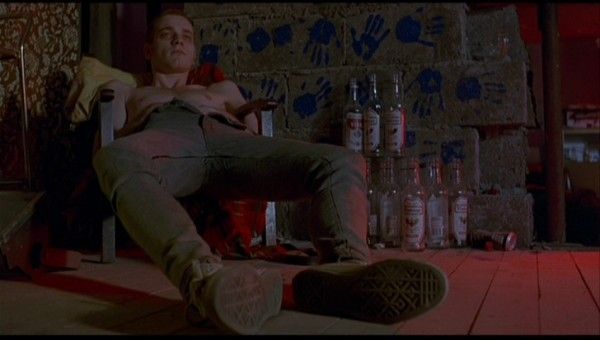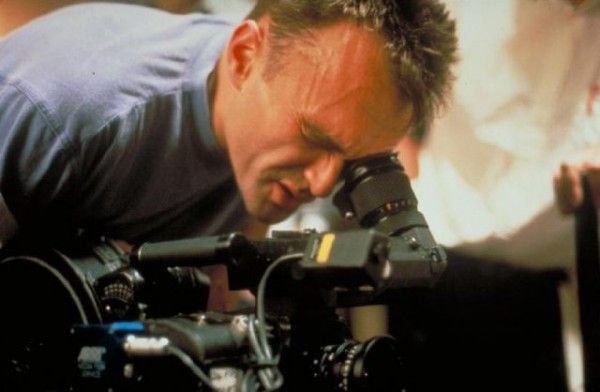For white male teenagers in the 1990s, especially those who thought cynicism was a special talent they had fought for and acquired rightfully, the release of Danny Boyle’s Trainspotting was just about all that mattered for a stretch. The pickled, fluid monologues that Ewan McGregor’s Mark Renton spewed out over intoxicating yet nightmarish set pieces littered throughout not-so-sunny Edinburgh were easy to co-opt as anti-establishment screeds. At the time, Renton, Sick Boy, Spud, Begbie, Tommy, and the Mother Superior were cool and Trainspotting, as an extension, was the coolest movie out there. Even the dead baby crawling on the ceiling was, in its way, cool.
Two decades and several hundred thousand humiliations (read: life lessons) later, Trainspotting remains a great movie from a severely changed perspective. Renton is no longer cool, at all. He is a cowardly elitist who never had the courage to try anything much more than getting as much as he could from the Scottish welfare system to stay high on opioids, particularly heroin. The inner monologue that McGregor spits – the accented voice snarling about choosing life and family and the big TV – exposes a far more seductive and witty voice than the one that Renton uses to secure his hits and deflect anguish. It’s notable that the film’s most horrific sequence – the death of Baby Dawn – is marked by a scrambling, desperate line of reasoning anchored to a selfish, almost heartless sentiment: “It’s not mine.” It concludes with Renton saying simply that he’s going to cook up, instead of offering Jonny Lee Miller's Sick Boy or the child’s junkie mother anything like solace or comfort.
The death of Baby Dawn is a pivotal sequence for the film, a way of highlighting just how terrifying addiction can get, as much for the dead child as for the need to submerge personality and emotional honesty for a life of simply finding and taking drugs until you’ve exited this plane. Considering how thrilling and funny much of what Renton & Co. do ends up feeling in Boyle’s eye, the ugly moments are necessary to show just what these people are running away from when they steal electronics or rob tourists to supply their lifestyle. Boyle, to his credit, isn’t shy about Baby Dawn’s death or, for that matter, Renton’s nightmarish detox. In contrast, Renton’s dive down the worst toilet in Europe and Spud’s, er, accident in his girlfriend’s bed seems almost cute.
Working from a script by John Hodge, a regular collaborator of Boyle’s, the filmmaker suggests that the problem is not drugs but an inability to come to terms with the compromise and responsibility of daily life. This is not a particularly fresh idea. In fact, it’s a vaguely traditional perspective on addiction. If there is an issue to be had with Hodge’s script, it’s that the reasons for addiction are never really explored or even alluded to in the film. There is a flash of this when Renton suggests that his mother is also, in her “domestic” way, an addict, but this is barely developed. Another mildly troubling area would be the female characters, who are all portrayed as tough-as-nails, opinionated, and the only reasonable parts of these men’s lives. There is only one female addict - Baby Dawn’s mother, Allison (Susan Vidler) - and she has the total of five lines tops.
That being said, these characters are not exactly hard to like or even empathize with. Sick Boy is suave, playful, and handsome, even as his rants about Sean Connery and the inevitability of decay begin to take on the tint of someone talking about nothing to avoid saying something. (Not for nothing does he deflect his own hurt in the Baby Dawn sequence by simply screaming, “Say something” to Renton.) Spud (Ewen Bremner) is a weird, weak buffoon without much use to the group but he’s also loyal, giddy, and very funny in stretches. One does wish that Tommy would have ended up something more than a thin cautionary tale but the performance by whatshisname illuminates a tragic foolishness in the character that goes well beyond Hodge’s dialogue. And as for Robert Carlyle’s Begbie, the one who shuns opioid addiction but is constantly drinking, smoking, and fighting, his fury and pomposity suggests the very real terror that can occur without the use of illegal substances.
An extension of that balance is the way that Boyle and Hodge blend fantasy with reality to convincingly evoke the nightmarish swirl of junkie life. There are eruptions of imagination in the production design – the bar where Renton meets Kelly Macdonald’s Diane named Volcano - and in the cutting of the detox sequence and the opening shots of the climactic trip to London. And yet, the work that Renton and his gang do to make sure they have their drugs feels remarkably authentic, as does the sexual frustration, the paranoia, and the final indulgence of betrayal. The film is clearly modeled after A Clockwork Orange and the parallels are innumerable as much in the film’s themes as its aesthetic. Where Kubrick was more theoretical, distanced, and even clinical in his depiction of the Droogies, however, Boyle is messier, more human, and driven by a noticeable grip on pop culture, music, and Scotland’s fraught fight for independence from Britain.
The electric pacing of the film would become a familiar element of Boyle’s cinema, even in fiascos like The Beach and Trance, but only with 28 Days Later would Boyle ever make another movie in the same galvanizing orbit as Trainspotting. It’s in these two situations where the characters feel out front and not guided by a writer’s want to get fancy with words or put emphasis on a rigidly constructed plot. In both cases, we’re not constantly aware of how and where the story is guiding us, which simply cannot be said of Steve Jobs or the egregiously over-praised Slumdog Millionaire. Boyle has seemingly become uninterested in ugliness and horror, opting for the safe environs of prestige and genre pictures. Sure, Sunshine is pretty good and Millions is underrated, but both are almost immediately concerned with premise over pulse. The stories feel contained and predictable from the moment the movies start. For all of Boyle’s impressive technical abilities, he uses them almost exclusively to press the urgency of the story rather than bring out the hidden depth of the characters. This is also true of his riveting debut, Shallow Grave, an inspired Hitchcock riff.
Trainspotting reflects a number of issues that must have been personal to Boyle, even as he was born in Manchester rather than Scotland. The image of London as a busy tourist destination with an increasing lack of character suggests charred, skeptical memories of his country but also alludes to a hesitancy to move to the big leagues after the promising success of Shallow Grave. Beneath all the talk of drugs and In the Name of the Rose and lord knows what else, Trainspotting is about money or, in a more precise way, capital. Keeping one’s self intoxicated and unemployed is not at all easy; neither is getting the money together for a movie. Both require an inventive mind to find ways to secure funds or simply steal what you need to keep the buzz up, and one does not have to search far to find a filmmaker likening the thrill of creation to a “high.”
Renton’s betrayal in London – skipping out on his junkie friends with the proceeds of a robbery in hand - reflects a kind of guilt in Boyle about possibly going mainstream. Nothing about London is cool in Trainspotting, not even the music, and Renton similarly becomes quickly at ease with the world of easy comfort and mindless work. “Normalcy” would seemingly become Renton’s new drug of choice as he walks out on his friends and talks about being “just like you” with the appliances, electronics, and all other sorts of materialistic joy. He’s still someone with bite, someone with a brain for tough, desperate situations, but he’s certainly no longer someone you would refer to as “cool.”

